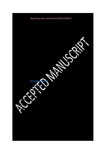Clam feeding plasticity reduces herbivore vulnerability to ocean warming and acidification
| dc.contributor.author | Van Colen, C | |
| dc.contributor.author | Ong, EZ | |
| dc.contributor.author | Briffa, Mark | |
| dc.contributor.author | Wethey, DS | |
| dc.contributor.author | Abatih, E | |
| dc.contributor.author | Moens, T | |
| dc.contributor.author | Woodin, SA | |
| dc.date.accessioned | 2020-01-23T14:53:00Z | |
| dc.date.available | 2020-01-23T14:53:00Z | |
| dc.date.issued | 2020-01-20 | |
| dc.identifier.issn | 1758-678X | |
| dc.identifier.issn | 1758-6798 | |
| dc.identifier.uri | http://hdl.handle.net/10026.1/15342 | |
| dc.description.abstract |
Ocean warming and acidification affect species populations, but how interactions within communities are affected and how this translates into ecosystem functioning and resilience remain poorly understood. Here we demonstrate that experimental ocean warming and acidification significantly alters the interaction network among porewater nutrients, primary producers, herbivores and burrowing invertebrates in a seafloor sediment community, and is linked to behavioural plasticity in the clam Scrobicularia plana. Warming and acidification induced a shift in the clam’s feeding mode from predominantly suspension feeding under ambient conditions to deposit feeding with cascading effects on nutrient supply to primary producers. Surface-dwelling invertebrates were more tolerant to warming and acidification in the presence of S. plana, most probably due to the stimulatory effect of the clam on their microalgal food resources. This study demonstrates that predictions of population resilience to climate change require consideration of non-lethal effects such as behavioural changes of key species. | |
| dc.format.extent | 162-166 | |
| dc.language | en | |
| dc.language.iso | en | |
| dc.publisher | Springer Science and Business Media LLC | |
| dc.subject | 14 Life Below Water | |
| dc.title | Clam feeding plasticity reduces herbivore vulnerability to ocean warming and acidification | |
| dc.type | journal-article | |
| dc.type | Journal Article | |
| plymouth.author-url | https://www.webofscience.com/api/gateway?GWVersion=2&SrcApp=PARTNER_APP&SrcAuth=LinksAMR&KeyUT=WOS:000508755400004&DestLinkType=FullRecord&DestApp=ALL_WOS&UsrCustomerID=11bb513d99f797142bcfeffcc58ea008 | |
| plymouth.issue | 2 | |
| plymouth.volume | 10 | |
| plymouth.publication-status | Published | |
| plymouth.journal | Nature Climate Change | |
| dc.identifier.doi | 10.1038/s41558-019-0679-2 | |
| plymouth.organisational-group | /Plymouth | |
| plymouth.organisational-group | /Plymouth/Faculty of Science and Engineering | |
| plymouth.organisational-group | /Plymouth/Faculty of Science and Engineering/School of Biological and Marine Sciences | |
| plymouth.organisational-group | /Plymouth/REF 2021 Researchers by UoA | |
| plymouth.organisational-group | /Plymouth/REF 2021 Researchers by UoA/UoA04 Psychology, Psychiatry and Neuroscience | |
| plymouth.organisational-group | /Plymouth/Research Groups | |
| plymouth.organisational-group | /Plymouth/Research Groups/Marine Institute | |
| plymouth.organisational-group | /Plymouth/Users by role | |
| plymouth.organisational-group | /Plymouth/Users by role/Academics | |
| plymouth.organisational-group | /Plymouth/Users by role/Researchers in ResearchFish submission | |
| dcterms.dateAccepted | 2019-12-10 | |
| dc.rights.embargodate | 2020-7-19 | |
| dc.identifier.eissn | 1758-6798 | |
| dc.rights.embargoperiod | Not known | |
| rioxxterms.versionofrecord | 10.1038/s41558-019-0679-2 | |
| rioxxterms.licenseref.uri | http://www.rioxx.net/licenses/all-rights-reserved | |
| rioxxterms.licenseref.startdate | 2020-01-20 | |
| rioxxterms.type | Journal Article/Review |


